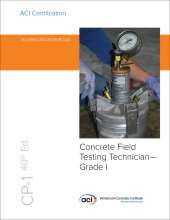The American Concrete Institute’s two masonry testing certification programs are now cited in TMS 402/602-16: Building Code Requirements and Specifications for Masonry Structures.
Published in December 2016, the newly updated masonry documents include language referencing certification in accordance with the Masonry Field Testing Technician and Masonry Laboratory Testing Technician programs.
As stated in section 1.6 A of TMS 402/602: “Masonry testing laboratory personnel who are certified in accordance with ACI Masonry Laboratory Testing Technician Certification Program, or equivalent program, are qualified.”
Additionally, section 1.6 B states: “Field technicians who are certified in accordance with the requirements of ACI Masonry Field Testing Technician Certification Program, or an equivalent program, are qualified to observe and/or prepare masonry specimens.”
It is expected that the programs will be referenced in the 2018 International Building Code and International Residential Code.
“Due to a variety of factors, including an increased need for quality assurance, masonry testing is becoming more common. Unfortunately, in some areas, testing technicians are not always familiar with masonry, nor its nuances that make it different than concrete,” said Phil Samblanet, executive director, the Masonry Society.
“The result can be improper testing, poor results, and headaches in the field. ACI’s Masonry Testing Technician Certification programs will further efforts to improve testing quality by letting contractors, designers, and owners know who is qualified to perform masonry testing.”
ACI’s masonry testing programs provide certifications to those technicians working in the laboratory or in the field who can demonstrate the technical knowledge and skills required for sampling and testing of masonry units, mortars, grout, and prisms. They are based on content from ASTM specifications.
“The masonry testing certification programs support advancing education with respect to proper techniques associated with masonry materials, and were created to help improve the quality of masonry construction,” said John W Nehasil, managing director of Certification, American Concrete Institute. “The industry will benefit from requiring ACI-certified masonry technicians.”
The TMS 402/602-16 was produced by the Masonry Society’s committee 402/602 on Building Code Requirements and Specification for Masonry Structures Committee. The committee was formerly designated as the Masonry Standards Joint Committee and was sponsored by the Masonry Society, American Concrete Institute, and the Structural Engineering Institute of the American Society of Civil Engineers. The Masonry Code was formerly ACI 530.
Program details for both masonry programs can be found on ACI’s website.
At World of Concrete, the American Concrete Institute launched a new section of its www.concrete.org website called ‘Why Certification.’ The pages serve as a resource for individuals, specifiers, and employers looking for more information on why certification is important for careers and businesses. Specific resources include: listing of where ACI certification is required; sample language for requiring certification; steps for individuals to get certified; steps for employers to get their people certified; testimonials from industry peers; and more.




